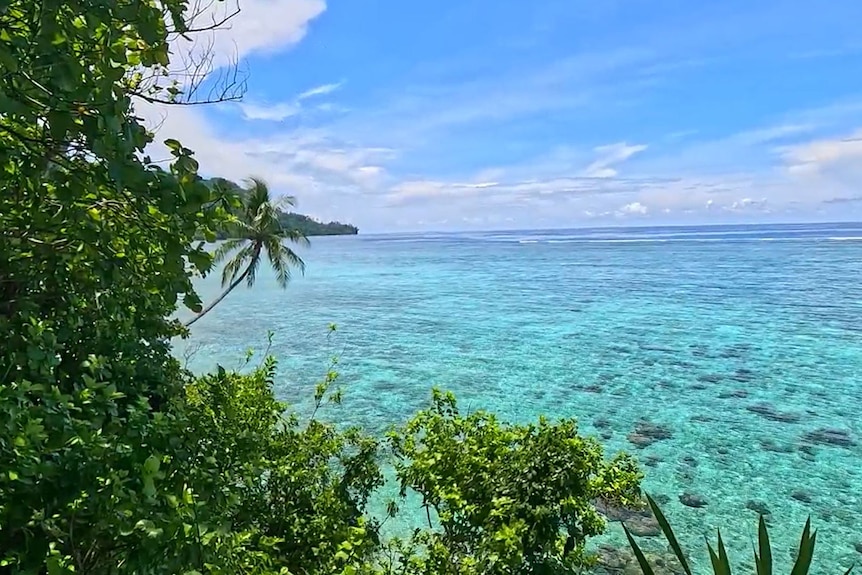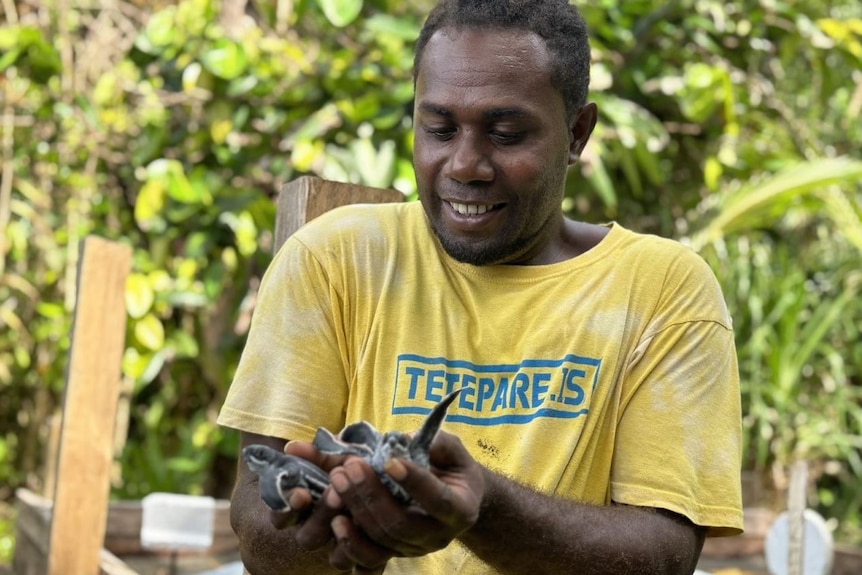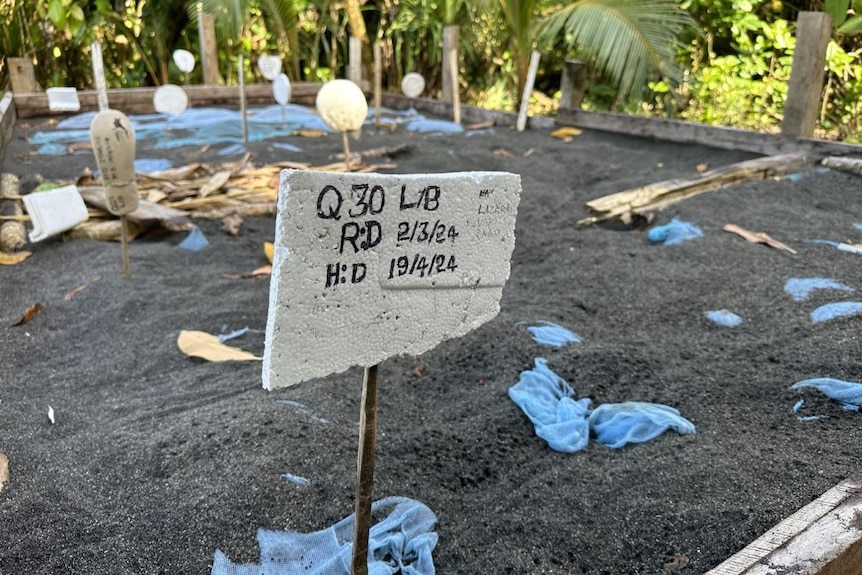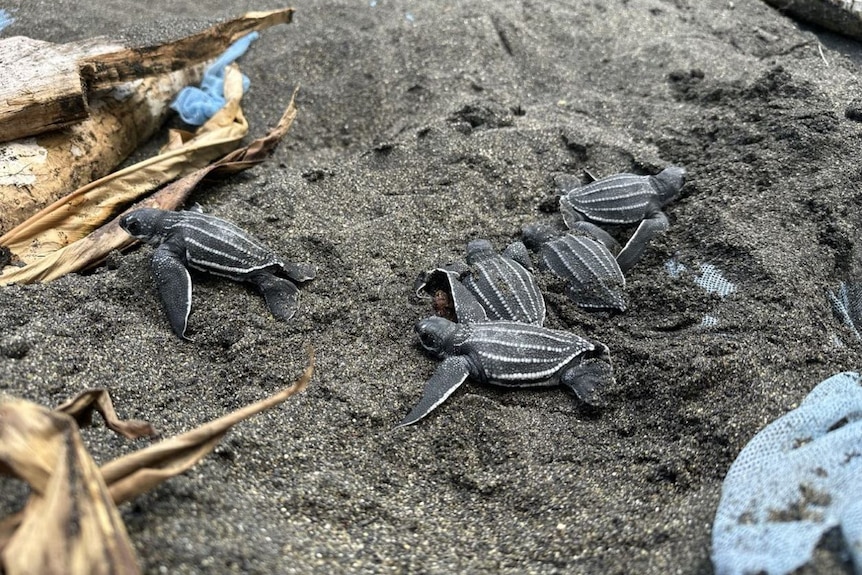The Pacific /
By Solomon Islands reporter Chrisnrita Aumanu-Leong
Mary Bea came to Tetepare about 200 years after her ancestors abandoned it.
(ABC News: Chrisnrita Aumanu-Leong)
On the black volcanic shores of Tetepare in Solomon Islands, locals say it's best that visitors introduce themselves to the land before going further.
Tetepare was once home to tribes of people, but it was abruptly deserted about 200 years ago.
It remains a mystery as to why, and accounts of the exodus differ.
The 120 square kilometres of pristine wilderness is one of the Pacific's largest uninhabited islands.
Tetepare was once home to tribes of people, but it was abruptly deserted about 200 years ago.
It remains a mystery as to why, and accounts of the exodus differ.
The 120 square kilometres of pristine wilderness is one of the Pacific's largest uninhabited islands.
Tetepare is located in Solomon Island's Western province, a two-hour boat ride from the nearest airport.(ABC News: Cordelia Brown)
A descendant of Tetepare's former inhabitants, Mary Bea, said it's believed warriors from nearby islands came headhunting — that is, collecting human heads — and drove people out.
Another reason might be that disease — possibly from contact with whalers — devastated its communities and made the island unliveable.
But in Ms Bea's telling, no matter what happened, the spirits that long protected the people of Tetepare left them to their fates.
The island of Tetepare, unlike many other parts of Solomon Islands, remains covered in forest.(ABC News: Chrisnrita Aumanu-Leong)
Today, the island, empty of human voices, greets visitors with a blanket of sound as birds, cicadas and other animals call.
And for descendants like Ms Bea, Tetepare is also alive with the presence of spirits.
"Every land where we live, there's people, there's villages, there's church houses, everything is there and the places change," she said.
"But this island here, nothing changes, and all the powers and customs of before still stand."
Now, people are coming back to Tetepare, if only to visit briefly.
Ms Bea operates an eco lodge there, where guests sometimes tell their hosts of strange, seemingly otherworldly encounters.
"We just smile. We know that what they're telling is true," she said.
Some speak of meeting a spirit Ms Bea knows as one of Tetepare's spirits, Orisogo, with ears like wild taro and who can make people lose their way on the island.
Others tell of meeting someone local people know as Kaluvesu, a spirit who protects people on the island.
"The island is alive," Ms Bea said.
"We love the island, we love our ancestors, we love our spirits and we believe in them, they are still alive and they are watching over us."
She said not every descendant or tourist enjoys it — a reason why local people advise visitors to introduce themselves to the island.
Ms Bea, though, feels comfortable there. She said it may be because of her long-fought efforts to protect it.
"We are working for it, it accepts us."
She's one of many people resisting the forces that have transformed other parts of Solomon Islands — including logging and climate change.
An island outside time
It's said that when Tetepare's people abandoned the island, a few remaining women departed in dugout canoes and paddled to neighbouring shores.
Some were taken in and got married on their new islands. It's their descendants, including Ms Bea, who are protecting Tetepare.
They mobilised about 20 years ago, after loggers came for the island.
Descendants of Tetepare island's inhabitants live in surrounding islands including Rendova. (ABC News: Cordelia Brown)
Ms Bea, who grew up on neighbouring Rendova Island and lives in nearby Munda, took strength from her female ancestors and tracked down other descendants to organise a protest.
"When I heard rumours in the village, I had a very heavy heart. I looked around for people who [opposed] logging," she said.
Ms Bea succeeded in rallying opposition, and the logging application was denied.
The long lost island still visible from space
Legend has it a jealous husband used a wave curse to sink Teonimenu into the ocean forever. Scientists have worked out what really happened.
Read more
But knowing future attempts to log Tetepare would come, she made it her mission to block them.
She travelled widely in the western part of Solomon Islands to raise awareness, and with other traditional landowners, formed the Tetepare Descendants Association to centralise control over its land.
Now, it has 3,000 members, all opposing logging on Tetepare.
With help from international conservation groups like the World Wildlife Fund, the descendants formed a plan helping landowners create a livelihood by caring for the island.
They set up a field station for scientists to study its animals and plants.
And at the end of a crushed coral path on Tetepare, an eco-lodge of thatched wooden huts hosts small numbers of tourists, providing income for landowners to pay local guides and rangers
But knowing future attempts to log Tetepare would come, she made it her mission to block them.
She travelled widely in the western part of Solomon Islands to raise awareness, and with other traditional landowners, formed the Tetepare Descendants Association to centralise control over its land.
Now, it has 3,000 members, all opposing logging on Tetepare.
With help from international conservation groups like the World Wildlife Fund, the descendants formed a plan helping landowners create a livelihood by caring for the island.
They set up a field station for scientists to study its animals and plants.
And at the end of a crushed coral path on Tetepare, an eco-lodge of thatched wooden huts hosts small numbers of tourists, providing income for landowners to pay local guides and rangers
.
The water around Tetepare is rich with corals and diverse, colourful marine life. (ABC News: Chrisnrita Aumanu-Leong)
Visitors snorkel and swim in its turquoise waters, hike its forests, and watch the local wildlife.
Under the island's canopy of ancient trees, monitor lizards stalk past, tails swishing. Crocodiles lie on a black sand beach. Crabs scuttle over the forest floor.
Today, partly through the efforts of Tetepare's descendants, the island appears like a place outside time.
But despite its isolation from human settlements, its animal life is showing signs of stress.
Fighting for life
Clement Limae, a tour guide and former ranger who frequently visits Tetepare, presses his hand softly on the sand.
He is checking whether any of the turtle eggs buried beneath have hatched.
The island's beaches are some of the few places in the world where leatherback turtles — an endangered species — lay their eggs.
Clement Limae is part of efforts to protect the leatherback turtle population.(ABC News: Chrisnrita Aumanu-Leong)
Rangers work in challenging conditions to keep them alive, living on low pay and paying high costs of fuel to travel by boat to the island.
They spend a week at a time on a remote beach on Tetepare monitoring the turtle nests, with only a small thatched hut for shelter.
If their food doesn't last the week, or anything else goes wrong, they must hike back through the forest for hours, navigating crocodiles and the venomous Solomon Islands giant centipede.
Mr Limae said on Tetepare, rising sea levels threaten to stop the turtles' journeys before they've even started.
"We [rangers] relocate them from the original nest … because of sea level rise, otherwise the nest is getting wet by the saltwater and it's getting spoilt," he said.
Rangers move turtle eggs to a safe haven on the beach if they're at risk of being flooded by seawater.(ABC News: Chrisnrita Aumanu-Leong)
In a sand bed boxed in by wooden planks at the other end of the beach, where relocated eggs are buried, Mr Limae lifts a net and scoops the sand, lifting out five small leatherback hatchlings.
Normally, they could dig their way to the top after hatching, before making a dash for the ocean.
But the netting protecting them from predators means they need the help of rangers to reach the surface
The water around Tetepare is rich with corals and diverse, colourful marine life. (ABC News: Chrisnrita Aumanu-Leong)
Visitors snorkel and swim in its turquoise waters, hike its forests, and watch the local wildlife.
Under the island's canopy of ancient trees, monitor lizards stalk past, tails swishing. Crocodiles lie on a black sand beach. Crabs scuttle over the forest floor.
Today, partly through the efforts of Tetepare's descendants, the island appears like a place outside time.
But despite its isolation from human settlements, its animal life is showing signs of stress.
Fighting for life
Clement Limae, a tour guide and former ranger who frequently visits Tetepare, presses his hand softly on the sand.
He is checking whether any of the turtle eggs buried beneath have hatched.
The island's beaches are some of the few places in the world where leatherback turtles — an endangered species — lay their eggs.
Clement Limae is part of efforts to protect the leatherback turtle population.(ABC News: Chrisnrita Aumanu-Leong)
Rangers work in challenging conditions to keep them alive, living on low pay and paying high costs of fuel to travel by boat to the island.
They spend a week at a time on a remote beach on Tetepare monitoring the turtle nests, with only a small thatched hut for shelter.
If their food doesn't last the week, or anything else goes wrong, they must hike back through the forest for hours, navigating crocodiles and the venomous Solomon Islands giant centipede.
Mr Limae said on Tetepare, rising sea levels threaten to stop the turtles' journeys before they've even started.
"We [rangers] relocate them from the original nest … because of sea level rise, otherwise the nest is getting wet by the saltwater and it's getting spoilt," he said.
Rangers move turtle eggs to a safe haven on the beach if they're at risk of being flooded by seawater.(ABC News: Chrisnrita Aumanu-Leong)
In a sand bed boxed in by wooden planks at the other end of the beach, where relocated eggs are buried, Mr Limae lifts a net and scoops the sand, lifting out five small leatherback hatchlings.
Normally, they could dig their way to the top after hatching, before making a dash for the ocean.
But the netting protecting them from predators means they need the help of rangers to reach the surface
.
Turtle hatchlings face a dangerous journey to the water after reaching the surface of their nest.(ABC News: Chrisnrita Aumanu-Leong)
Mr Limae said a lack of funds and fuel means the rangers sometimes can't make it to the beach in time.
"We need support [to] keep doing this work," he said.
Rangers help protect them on their perilous journey into the water, as birds and lizards try picking them off.
"A lot of predators contribute to this, [and] kill them. It's challenging … And that's why we are always here to help them survive."
As a large wave washes ashore, one of the leading hatchlings is swept up and away.
Their fight for life mirrors the one rangers and descendants make each day to protect Tetepare, its wildlife, and its traditions.
Sitting at the eco-lodge, Ms Bea said the island's stories are still passed down today.
"They are our stories. We all know the stories," Ms Bea said.
"This is a spirit island. And it is still now in the hearts of every descendant of Tetepare."
Additional reporting by Doug Dingwall
Turtle hatchlings face a dangerous journey to the water after reaching the surface of their nest.(ABC News: Chrisnrita Aumanu-Leong)
Mr Limae said a lack of funds and fuel means the rangers sometimes can't make it to the beach in time.
"We need support [to] keep doing this work," he said.
Rangers help protect them on their perilous journey into the water, as birds and lizards try picking them off.
"A lot of predators contribute to this, [and] kill them. It's challenging … And that's why we are always here to help them survive."
As a large wave washes ashore, one of the leading hatchlings is swept up and away.
Their fight for life mirrors the one rangers and descendants make each day to protect Tetepare, its wildlife, and its traditions.
Sitting at the eco-lodge, Ms Bea said the island's stories are still passed down today.
"They are our stories. We all know the stories," Ms Bea said.
"This is a spirit island. And it is still now in the hearts of every descendant of Tetepare."
Additional reporting by Doug Dingwall
No comments:
Post a Comment